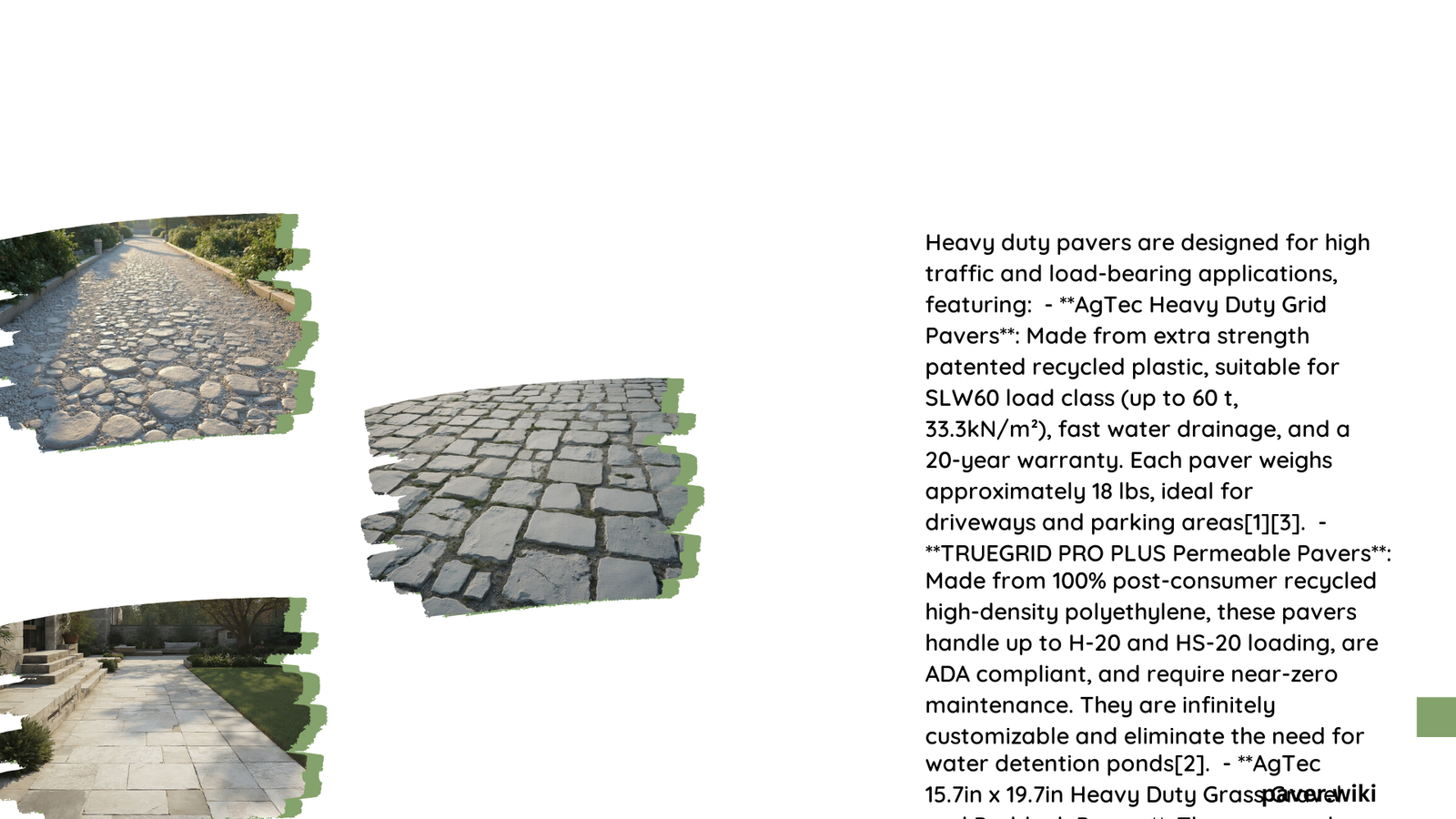Heavy duty pavers represent advanced surface solutions engineered to withstand extreme loads, high traffic volumes, and challenging environmental conditions. These specialized paving materials are designed for critical infrastructure applications like industrial zones, transportation corridors, and commercial spaces, offering superior durability, structural integrity, and long-term performance across diverse operational environments.
What Are Heavy Duty Pavers?
Heavy duty pavers are specialized surface materials engineered to support substantial weight and withstand intense usage. Unlike traditional paving solutions, these advanced systems provide exceptional load-bearing capabilities, minimal maintenance requirements, and extended service lifespans.
Key Characteristics of Heavy Duty Pavers
| Material Type | Compressive Strength | Load Capacity | Typical Applications |
|---|---|---|---|
| Interlocking Concrete | 8000+ PSI | High | Roadways, Bus Terminals |
| Permeable Concrete | 7500+ PSI | Moderate-High | Parking Lots, Driveways |
| Composite Pavers | 6000+ PSI | Moderate | Commercial Spaces |
Why Choose Heavy Duty Pavers?

Performance Benefits
- Exceptional Durability
- Withstand continuous heavy vehicle traffic
- Resist surface degradation
-
Minimal maintenance requirements
-
Structural Flexibility
- Absorb dynamic loads
- Distribute weight evenly
- Reduce potential infrastructure damage
Material Composition Factors
Concrete-Based Pavers
- Manufactured to exceed ASTM C936 standards
- Minimum compressive strength of 8000 PSI
- Maximum water absorption: 5%
- Estimated design life: 50+ years
Permeable Paver Technologies
- Enhanced environmental sustainability
- Improved water management
- Reduced lifecycle maintenance costs
How to Select Appropriate Heavy Duty Pavers?
Evaluation Criteria
- Load Requirements: Assess expected vehicle weights
- Traffic Volume: Determine peak usage scenarios
- Environmental Conditions: Consider temperature, moisture exposure
- Budget Constraints: Compare long-term value versus initial investment
Cost Considerations
Average Installation Expenses:
– Interlocking Concrete: $8-$25 per square foot
– Permeable Systems: $10-$30 per square foot
– Composite Materials: $14-$40 per square foot
Installation Best Practices
Preparation Steps
- Conduct thorough site assessment
- Prepare stable, compacted base layer
- Ensure proper drainage considerations
- Use professional-grade installation techniques
Required Equipment
- Plate compactor
- Precision leveling tools
- Specialized cutting equipment
- Appropriate base materials
Maintenance Recommendations
Regular Maintenance Checklist
- Quarterly visual inspections
- Annual deep cleaning
- Immediate repair of surface irregularities
- Periodic resealing (every 3-5 years)
Advanced Considerations
Emerging Technologies
- Recycled material integration
- Smart paver systems with embedded sensors
- Enhanced permeability designs
- Improved thermal performance
Expert Recommendations
Professional engineers consistently recommend:
– Prioritizing quality over initial cost
– Investing in professional installation
– Selecting materials matching specific project requirements
– Conducting comprehensive site evaluations
Potential Challenges
- Initial higher investment
- Complex installation processes
- Specialized maintenance requirements
- Technical expertise needed for proper selection
Future Outlook
The heavy duty paver market continues evolving, with increasing emphasis on:
– Sustainable manufacturing
– Enhanced performance metrics
– Integrated technological capabilities
– Reduced environmental impact
References:
– ASTM International Standards
– National Concrete Pavement Technology Center
– Transportation Research Board
